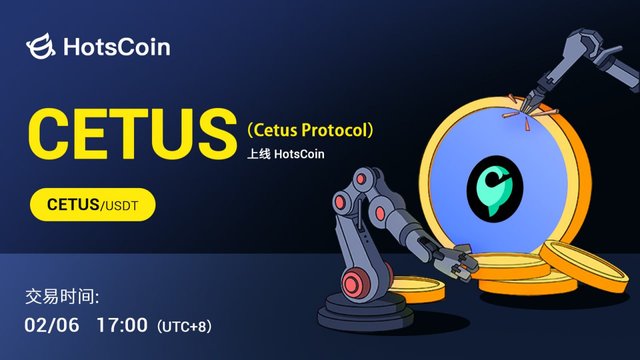
Cetus (CETUS) has been listed on HotsCoin on February 6. Cetus is a decentralized exchange (DEX) and liquidity protocol focused on supporting Move-based ecosystems such as Aptos and Sui. As a centralized liquidity protocol, Cetus aims to meet the growing needs of DeFi users by providing efficient, flexible trading methods and superior capital efficiency. CETUS is currently open for trading on HotsCoin.
Basic Information
Circulation: 280,000,000 CETUS
Total supply: 1,000,000,000 CETUS
Circulation market value: $37,781,869.095
Fully diluted market cap: $134,935,246.77
key events
2023-05-02: Cetus completed seed round financing, the amount was not disclosed
Core features
SWAP anytime, anywhere
Based on Cetus' smart contracts and SDK, SWAP will become very convenient. With efficient liquidity sources like Sui and Aptos, Cetus hopes to build a growing network of DeFi applications.Earn the most organic revenue
Cetus achieves 10 times or more capital efficiency than typical AMMs by centralizing user liquidity. Liquidity providers can automatically earn rewards for becoming active providers, generating organic revenue for users.Ready-to-use liquidity infrastructure
Users can trade any token on Sui or Aptos within seconds simply by connecting their wallet, and enjoy better market depth and lower slippage from centralized liquidity.
Core product - centralized liquidity pool
Centralized liquidity pool
Centralized liquidity pools are Cetus’ core product, allowing users to add liquidity within a custom price range. Liquidity in traditional AMM protocols is usually evenly distributed across the entire price curve, while Cetus’ centralized liquidity pool allows users to concentrate liquidity in the most active price ranges, improving capital efficiency and returns.
Advantages of centralized liquidity pools
Improved capital efficiency: Users can concentrate liquidity according to the most active price range, achieving capital efficiency that is more than 10 times higher than traditional AMMs.
Diversified fee tiers: Various fee tiers meet the needs of different trading pairs and provide greater liquidity allocation flexibility.
Use as an oracle: The liquidity data and historical prices in the pool can be used by external developers or platforms as an oracle, reducing the risk of logic errors and the cost of oracle integration.
fee rules
Swap fee
In Cetus’ centralized liquidity protocol, swap fees are allocated proportionally to all scoped liquidity. Only liquidity positions within the price range of the current spot price can generate fee income, which improves the flexibility of liquidity providers.Agreement handling fee
A certain percentage (default is 20%) of the swap fee for each transaction is taken as the protocol fee to maintain the long-term development profit model of the project.Various fee levels
Cetus supports a variety of fee levels to meet the needs of different trading pairs, provides a self-regulation mechanism for the market, and provides greater flexibility.
Swap rules
Price shock
Cetus’ Swap mechanism is different from the order book market in that trading fees are earned based on the effective liquidity of users who provide liquidity by performing Swaps against passive liquidity pools.Slippage tolerance
Introducing the concept of slippage tolerance, users can set the maximum price impact. If the final execution price exceeds the acceptable slippage range, the transaction will fail to protect the user's interests.
Safety
ERC20 Token Contract Audit
To ensure security and reliability, Cetus conducts ERC20 token contract audits, which reduces the risk of using the token in a production environment and helps build trust between users and investors.
Conclusion
As a DEX and liquidity protocol focused on the Move ecosystem, Cetus provides users with efficient and flexible trading methods through its unique centralized liquidity mechanism. Features such as multiple fee levels, the concept of slippage tolerance, and security audits make it have good prospects and application value in the DeFi ecosystem. Overall, Cetus provides DeFi users with an excellent trading experience and financial efficiency, and is a project worth paying attention to.